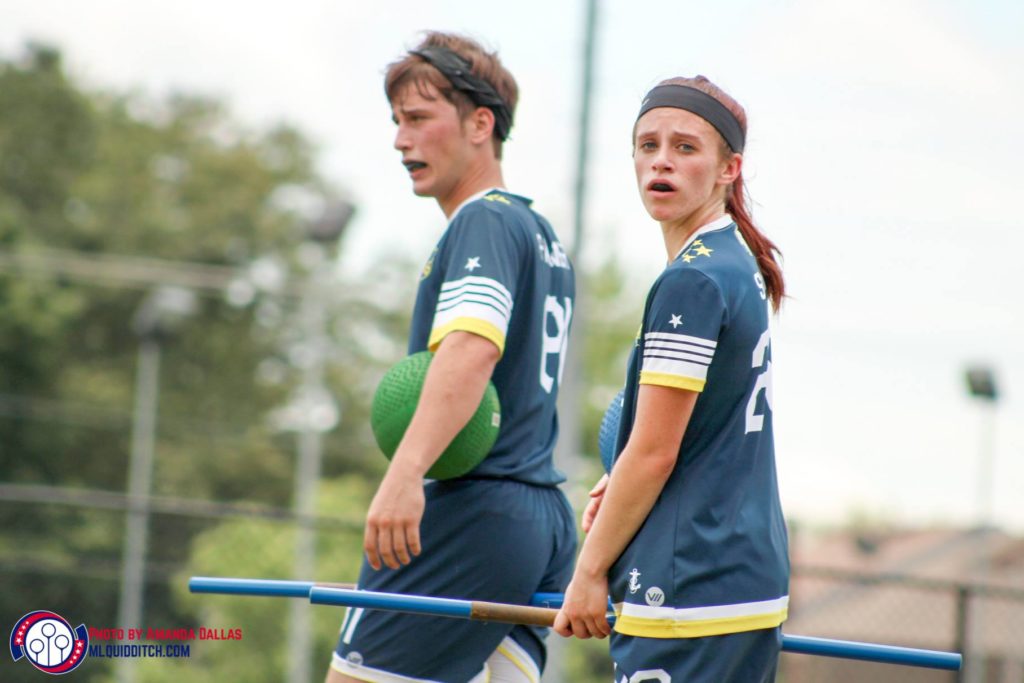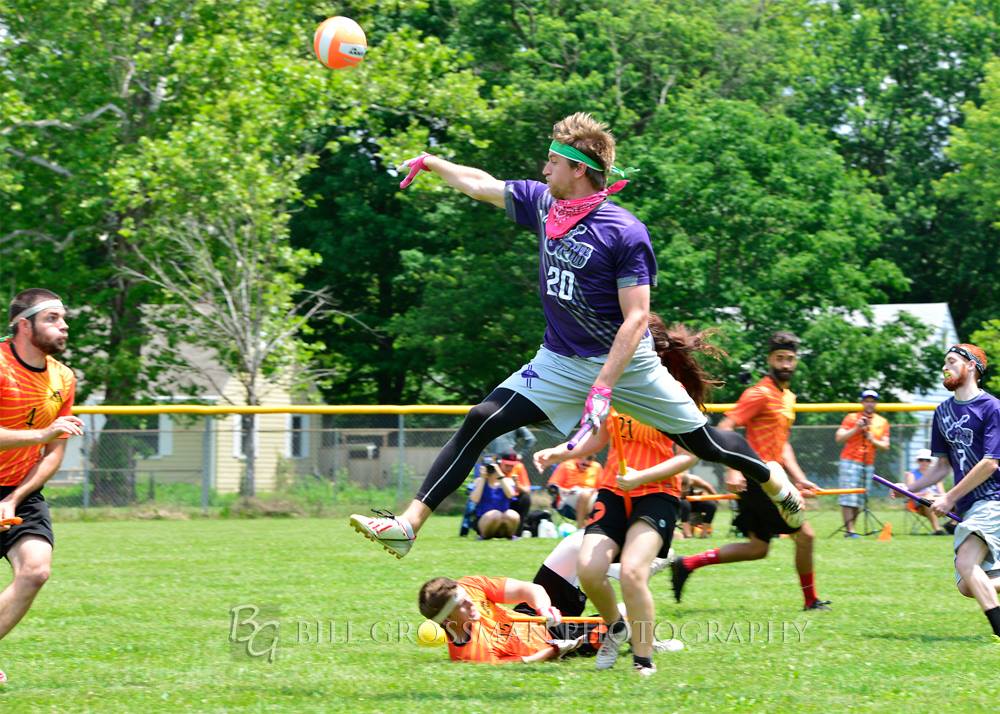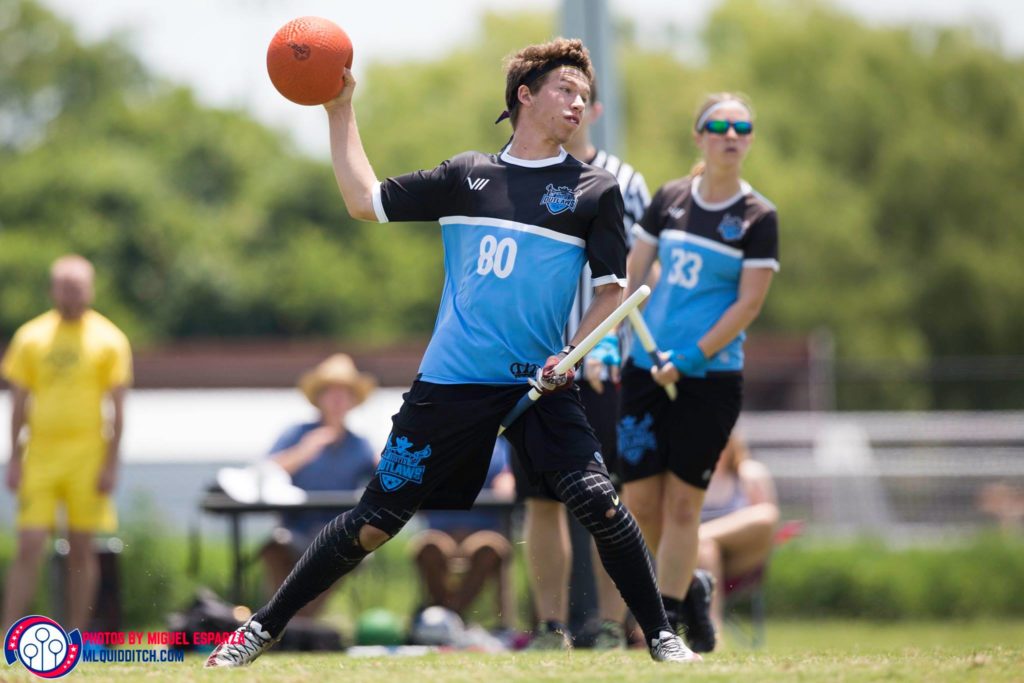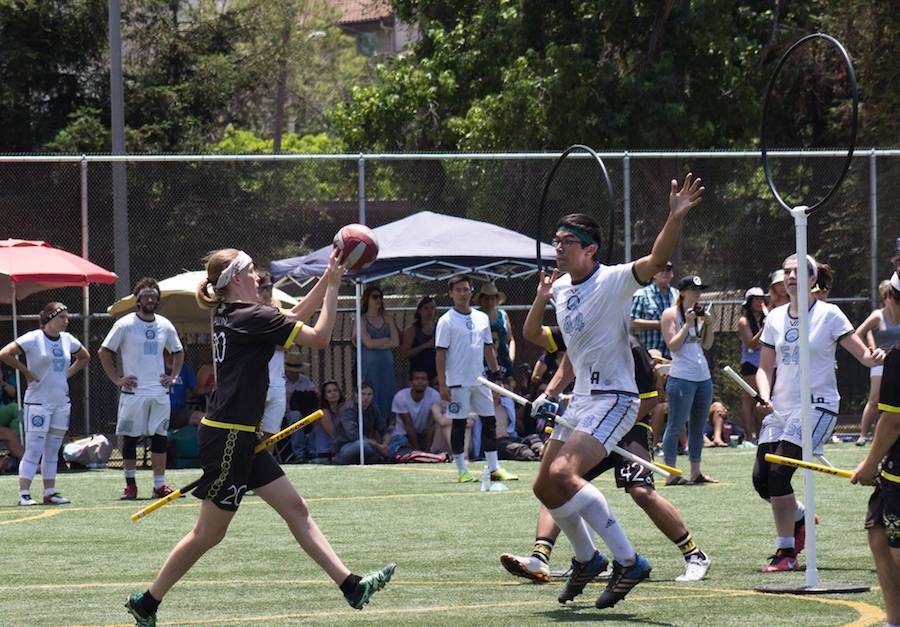Antwerp QC, Much of Belgian Core, Leaves Competitive Quidditch
By Ethan Sturm, Tyler Walker, We Breathe Quidditch and Kevin Oelze
With just two weekends left of the MLQ regular season, we have been gifted with some of the most pivotal MLQ matchups of 2017. This weekend and the following will be make or breaks across the board—1 vs. 2 seeds vying for a divisional title and 3 vs. 4 seeds battling it out for a qualifying spot.
East Division
Boston Night Riders (2017: 6-0, 1st) at Washington Admirals (2017: 4-2, 2nd)
July 22, 12 pm EDT
All-Time Series: Boston 6-0
The MLQ East Division’s season closes with a matchup between its first and second place teams. The Boston Night Riders need just a single victory in the three-game series to clinch their third division crown, while the Washington Admirals would need a sweep on home soil to earn their first divisional title. However, with the Night Riders’s undefeated streak still intact, even a single Admirals victory would make headlines across the country as both teams prepare for the MLQ Championship.
There is no shortage of familiarity between these rosters and thus little the teams will be able to use to surprise each other. Boston coach Harry Greenhouse and Washington coach Patrick Rardin played together at the University of Maryland, while the Night Riders’s Jules Baer played at the University of Richmond. There is also plenty of overlap between these rosters and those of MLQ years past, including a heated series in Washington two years ago.

Credit: Amanda Dallas
For the Admirals, they will need to achieve some degree of parity in the beater game to stand a chance at pulling off an upset. Colby Palmer and Melissa Smith have played the lion’s share of minutes in the beater game—they are the league leaders in drives played at the position—and have been efficient in doing so, with Smith most notably toting a +110 +/- rating. But their conservative play and minimal participation in the offense make it difficult for them to affect a game to the degree the Boston foursome can. While Leeanne Dillmann, Max Havlin, Mario Nasta and Lulu Xu have created a combined 40 no-bludger situations, Smith and Palmer– along with Anna Leonard and Cody Nardone–have created just 10 in nearly the same number of drives against the same two teams. This may not be a game changer if Washington can establish bludger control and hold onto it, but it makes it possible for the game to spiral out of control if they cannot.
In the quaffle game, it will come down to a matter of efficiency. Washington’s Rardin and Boston’s Teddy Costa are amongst the league leaders in turnovers, while Costa has missed more shots than anyone in MLQ. Bernardo Berges of the Admirals has the second-lowest shooting percentage amongst those with at least 12 shots, while Jayke Archibald of the Night Riders has an assist-to-turnover ratio below 0.5. Both teams will likely need to prioritize their most efficient players in this series, be it Justin Barnard of Washington or Boston’s second line. Because while the Admirals’s low efficiency in the quaffle game is likely a result of their conservative beater play, a large number of missed shots and turnovers is a recipe for a lot of fast break goals allowed against Boston.
If the Admirals were to nick a game off of the Night Riders, it would likely be a low-scoring affair. Washington’s offense will struggle to break down a physical Boston defense, especially if they are not creating no-bludger situations. Instead, they need to turtle bludger control when they get it and keep it for as long as possible, goading the Boston offense into low-efficiency possessions whenever possible and nabbing a few goals through mid-range shots and broken plays. From there, they will need to keep the pace slow, eliminate fast breaks from the equation and get to 20 minutes, where Darren Creary can wreak havoc on the snitch and earn the team a shocking victory.

Credit: Bill Grossman
North Division
Cleveland Riff (2017: 1-5, 3rd) at Detroit Innovators (2017: 0-6, 4th)
July 22, 9:30 am EDT
All-Time Series: Cleveland 4-2
This is the Detroit Innovators’ series to lose. Not only is it being played at home at 9:30 am, but the rosters are more weighted for a Detroit victory than any other series in the North this year.
This is the best rendition of a Detroit team we will see in the regular season. They have their top female chasers and male beaters in attendance. They also have keeper Chris Barnard, who they were obviously missing in the Rochester Whiteout series, and chaser Brock Lowery, who was absent from the Indianapolis Intensity matchup. What we will see on Saturday morning is as good of a Detroit as we can expect all season. The question is if they can put it together on pitch.
Cleveland Riff, on the other hand, is missing a lot. Hisham Abad, Sam Beeler, Mitch Boehm, Jeremy Boettner, Zach Conkle, Dan Daugherty, Max McAdoo, Jenna Rindler and Pari Yost are all absent. In case you do not know the names above, they each top the Riff depth chart at their respective positions.
The keeping combo of David Hoops and Jeremy Mak will struggle without playmakers around them, but will still be tasked with creating offense. Chaser Mitch Brown will be crucial, but players like Tiffany Hu, Mike Pence and Zach Pollock will need to play quality minutes on both sides of the ball if Riff hopes to have a chance. Beaters Matt Eveland and Leah Reese will be looked upon to combat a deep Detroit beating line. The Riff beating line is identical to the one which struggled against a weaker Rochester Whiteout beating corp.
It is hard to imagine a more perfect scenario for the Detroit Innovators to claim a bid, win their first series and dodge last place in the North for the first time in franchise history. Still the last championship spot in this division will not go quietly. Cleveland is a team with a lot of heart and, despite a slim roster, will make this a very interesting series.

Credit: Miguel Esparza
South Division
League City Legends (2017: 4-2, 2nd) at Austin Outlaws (2017: 6-0, 1st)
July 22, 11 am CT
All-Time Series: Austin 3-0
Step one: Take a team that has already won a USQ Championship. Step two: Remove a few of the weaker players and replace them with players from the next best team in the area. That formula is not only the one used by the current Austin Outlaws, but also the one used by last year’s MLQ champion, the Boston Night Riders. In short, the Outlaws enter their final series as the predominant favorites, never playing a game in snitch range or even close to snitch range this season. Meanwhile, the League City Legends play tough quidditch but have barely eked out 2-1 victories in both of their series. League City has played every game in range save one: a 250-90 victory over a damaged Kansas City Stampede roster.
On paper, this shouldn’t be a close contest. The Legends come to Austin with not only a shaky 3-2 SWIM record, but without a single non-male beater rostered. While League City has shown effective use of the two-male beater set–running it exclusively in the third round of their New Orleans Curse series and during their Kansas City series–not having the freedom to switch to a standard set could prove very costly in a series where every advantage could help. And yet, the Legends are not without their stars. Team USA beater Michael Duquette has not had the same sort of success since leaving his alma mater, but has never come out worse in a matchup with the Outlaw’s Jackson Johnson, whether on University of Texas or Lone Star Quidditch Club. Beaters Josh Carroll, Zach Pickett and Ryan Peavler have been playing beater at a high level longer than any beater on the Outlaws and the Legends’ signature physical chaser play–with hard hitters like Dilan Freeman, Hank Dugie and Kevin Tran–was the key to their upset of the Los Angeles Guardians in last year’s MLQ Championship. Moreover, last year, the Legends were the only team to play the Outlaws in snitch range before the final.
But that was then and this is now. League City has the raw talent to play the Outlaws to a snitch-range game, but it will require perfection. Austin’s entire formula for putting teams out of range was to let their beaters loose and use their incredible drivers to tear through their opponents’s defenses. A slip of six seconds by any beater or chaser is an easy score. And League City has been far from perfect this season. Duquette might lead his team in the number of faceoffs he’s won or the number of turnovers he’s created, but he also leads his team in the number of zero bludger drives he’s given to the other teams’s offenses. Playing this liberally with bludgers is dangerous when creating a zero bludger opportunity is the bedrock of your opponent’s game plan. The physical and tackle-heavy play of the Legends’ beater corps makes them also one of the most carded in the league and playing a beater down against Austin’s beater corps is the equivalent of handing them a goal. Fundamentally, the Legends’s beaters will need to find a way to win one-on-one matchups with other beaters. In their only series with a completely healthy opposings beater corps throughout, League City won only 43 percent of faceoffs and gave up an average of four zero bludger drives a game before snitch on pitch play. New Orleans has good beaters, but a repeat performance of winning less than half of the one-on-one beating faceoffs is easy prey for a dominant Outlaws chasing side.
There is only one way to stop the Outlaws: The Legends beater corps must be able to dominate any standard male-non-male set the Outlaws feed them. Then, when the Outlaws run two male beaters, League City must play smart, conservative play, while their chasers play physical defense. The goal of League City will be to hopefully tire out Austin’s non-male chasers and male beaters (of which they have only three and four rostered, respectively) with physical defense to hopefully create matchups on offense.
Winning is possible for League City, but it will require a team performance the likes of which have yet to be seen this season. Expect the Outlaws to sweep.

Credit: KimChe Photography
West Division
Salt Lake City (2017: 1-5, 3rd) at Phoenix Sol (2017: 1-5, 4th)
July 22, 6 pm MST
All-Time Series: Salt Lake City 3-0
Salt Lake City Hive head down to Phoenix in a clash to determine the last spot in League City for the MLQ West. While the San Francisco Argonauts and Los Angeles Guardians are set to tussle next weekend for the top seed overall, the Hive have fallen from a 7-2 divisional record in 2016 to a 1-5 record in 2017, needing to take two of three games from the home team in order to stay alive.
While going into the year, the Hive would be heavily favored in this matchup, this series instead looks to be trending away from them. The Hive hoped to avenge a disappointing 2-1 loss to the Argonauts in Los Angeles, but instead were easily swept by a Guardians side that was able to overwhelm them in the beating and transition game. Having lost promising rookie Connor Kaegi between the Argonauts and Guardians series, the Hive took another heavy blow with keeper Cameron Vombaur’s knee injury likely sidelining him for the rest of the summer. Look for under-appreciated chaser Gina Allyn to pick up the slack with strong finishes behind the hoops–if the Hive ball handlers can get the ball to her. For a team already struggling to put up points, the loss of its best offensive playmakers is hardly ideal.
The Hive is also vulnerable in its seeker game. Last year, the Hive rode on the back of division MVP Dan Howland to take all four of its wins in snitch range (the rest of the season’s victories were due to a Phoenix Sol series forfeit). This is hardly the recipe for success against Phoenix, who has ASU’s dynamic seeker Jarrod Bailey. ASU managed to go a perfect 9-0 in snitch range games in the 2016-2017 season, and Bailey is also 1-0 in snitch range games this season, helping to secure the Sol’s lone victory of the season with a surprising win against the Argonauts.
To its credit, Phoenix fought hard while undermanned in the Argonauts series and does possess some top line talent. Alexander Makk found his stride in the Argonauts series with a deadly mid-range shooting game and the talents of Shane Bouchard are nothing to sneeze at. The Hive will attempt to combat this with athletic depth in the quaffle position. If Makk and Bouchard can get a hot hand, Phoenix can push Salt Lake out of snitch range. If, instead, Salt Lake’s size and athleticism can cause fatigue in a smaller Sol roster, we could see the series tip the other way.
The last factor to consider is the beating game. While both teams’s beaters have been outmatched by their opponents so far, this series should be a more even matchup that could be swung by whichever beaters can get the upper hand.
Archives by Month:
- May 2023
- April 2023
- April 2022
- January 2021
- October 2020
- September 2020
- July 2020
- May 2020
- April 2020
- March 2020
- February 2020
- January 2020
- December 2019
- November 2019
- October 2019
- August 2019
- April 2019
- March 2019
- February 2019
- January 2019
- November 2018
- October 2018
- September 2018
- August 2018
- July 2018
- June 2018
- April 2018
- March 2018
- February 2018
- January 2018
- November 2017
- October 2017
- July 2017
- June 2017
- May 2017
- April 2017
- March 2017
- February 2017
- January 2017
- December 2016
- November 2016
- October 2016
- September 2016
- August 2016
- July 2016
- June 2016
- May 2016
- April 2016
- March 2016
- February 2016
- January 2016
- December 2015
- November 2015
- October 2015
- September 2015
- August 2015
- July 2015
- June 2015
- May 2015
- April 2015
- March 2015
- February 2015
- January 2015
- December 2014
- November 2014
- October 2014
- September 2014
- August 2014
- July 2014
- May 2014
- April 2014
- March 2014
- February 2014
- January 2014
- November 2013
- October 2013
- September 2013
- August 2013
- July 2013
- June 2013
- May 2013
- April 2013
- March 2013
- February 2013
- January 2013
- December 2012
- November 2012
- October 2012
Archives by Subject:
- Categories
- Awards
- College/Community Split
- Column
- Community Teams
- Countdown to Columbia
- DIY
- Drills
- Elo Rankings
- Fantasy Fantasy Tournaments
- Game & Tournament Reports
- General
- History Of
- International
- IQA World Cup
- Major League Quidditch
- March Madness
- Matches of the Decade
- Monday Water Cooler
- News
- Positional Strategy
- Press Release
- Profiles
- Quidditch Australia
- Rankings Wrap-Up
- Referees
- Rock Hill Roll Call
- Rules and Policy
- Statistic
- Strategy
- Team Management
- Team USA
- The Pitch
- The Quidditch Lens
- Top 10 College
- Top 10 Community
- Top 20
- Uncategorized
- US Quarantine Cup
- US Quidditch Cup
